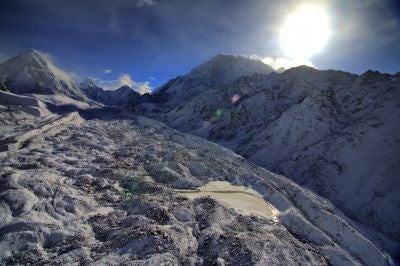India's environment minister under fire over glaciers

India's environment minister came under fire Tuesday from scientists for denying climate change was causing Himalayan glaciers to melt and disputing the work of the UN's top global warming body.
On Monday, Environment Minister Jairam Ramesh said there was no "conclusive scientific evidence" linking global warming to the melting of the glaciers and questioned work by the Intergovernmental Panel on Climate Change (IPCC).
The IPCC, a UN body regarded as the world's top authority on climate change, has warned Himalayan glaciers are receding faster than in any other part of the world and could "disappear altogether by 2035 if not sooner".
Shresth Tayal, a glaciologist with The Energy and Resources Institute (TERI) in New Delhi, rejected new research from an Indian scientist presented by Ramesh that denied the link between rising temperatures and receding ice.
"This report is incomplete. It has been written with a biased approach," said Tayal, who labelled the findings "self-contradictory".
"Do you think any scientist needs to prove that warming causes melting of ice? If there is heat, ice is bound to melt."
Tayal criticised the Indian government for endorsing the report, saying it should have analysed the results before making it public.
Rajendra Pachauri, chairman of the IPCC, blasted the research, calling it "unsubstantiated" and said Ramesh's support of it was "arrogant".
"I cannot see what the minister's motives are. We do need more extensive measurement of the Himalayan range but it is clear from satellite pictures what is happening," he told Britain's Guardian newspaper.
Ramesh admitted some glaciers were receding but said the rate was not "historically alarming" as projected by the IPCC, the Hindustan Times daily reported.
"The health of the Himalayan glaciers is poor, but according to the paper the doomsday prediction of the IPCC and Al Gore is also not correct," Ramesh said, referring to former US vice president and climate campaigner Al Gore.
Vijay Kumar Raina, the geologist who authored the research, echoed Ramesh, saying "nothing abnormal is happening to Indian glaciers".
"There's no evidence of climate change," said Raina, according to the Hindustan Times newspaper.
Pachauri likened the explanations to "climate change deniers and school boy science".
The IPCC has warned that the rivers of the Gangetic Basin, which feed hundreds of millions in northern India, could run dry once glaciers disappear.
But Ramesh denied any such risk existed and backed the findings of the study, "Himalayan Glaciers, a state-of-art review of glacial studies, glacial retreat and climate change," that looked at 100 years of data gathered by the Geological Survey of India from 25 glaciers.
Subscribe to Independent Premium to bookmark this article
Want to bookmark your favourite articles and stories to read or reference later? Start your Independent Premium subscription today.

Join our commenting forum
Join thought-provoking conversations, follow other Independent readers and see their replies